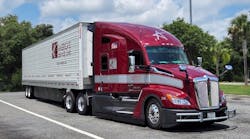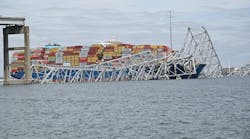While the financial bailout bill may be a positive step towards economic recovery, freight is going through tough times not seen since the recession of 1982 with small fleets being hit the hardest, according to analysts speaking during a FTR Associates webinar today.
“A lot has happened in the past few weeks and most of it isn’t very encouraging,” said Bill Witte, director of the Center for Econometric Model Research. “Our forecast is getting substantially more gloomy.” He added that while he considered the bailout bill a positive move as it directly injects equity into the economy, the credit crunch itself shows no signs of slowing as banks are still not lending to each other and industrial production remains “very bad” as most companies don’t want to take risks.
“We are now having to deal with the consequences of three consecutive years of freight decline,” said Noël Perry, managing director & senior consultant, FTR Associates. “We’re looking at a 1.5% to 2% decline in truckload in 2009, which approaches the worst we’ve reached since 1982.”
Perry noted that truck, rail and intermodal freight are all looking at yearly declines worse than any point since 1982, with rail down 4 to 5% from normal levels and intermodal down 8 to 9%. The only bright spots he sees are that fuel prices are going down and productivity is increasing as miles on the highway are declining, thereby reducing congestion.
“The bulk of the market remains owner-operators and small companies, and it’s clear that the small guys will be the most impacted,” said Jon Starks, transportation analyst for FTR. “The larger fleets continue to show strong asset sheets, although it may cost them more to get less.”
While small guys are under significant pressure, Starks saw a silver lining for owner-operators. “The owner-operator, in theory, has been in demise for the past 20 years or so, but they’re still kicking,” he said. “All of the large fleets have been downsizing their fleets and these owner-operators will be that swing capacity when freight comes back.”
Projections for individual segments of the industry are bleak. Eric Starks, president of FTR, said that the Class 8 market, currently at an annual rate of 155,000 units and getting worse, is unlikely to strengthen in the near future. He said that the annual rate fell to 145,000 during the last downturn in 2001, and it could easily hit 125,000 or 130,000 this time. In addition, trailer forecasts for 2009 are under 100,000, the lowest rate since 1982.
Starks said it is particularly worrisome that FTR’s projections are not indicating that recovery is on the horizon. While conditions in past recessions would hit bottom and then begin to rise, nothing is saying that will happen anytime soon. He sees no noticeable improvement until at least the 2nd half of 2010 and possibly 2011, as the average age of vehicles on the road will continue to go up. “The one positive we can take out of this is the longer that we’re mired in downturn, the quicker we’ll come out it,” he said. “We could have near record levels in 2012 or so.”
In the general economy, worsening conditions have forced Witte’s projections further downhill. He said that growth for the first half of 2009 was projected as flat and now has been amended to decline by 1.2%. The second half of 2009 was amended from slow growth to negative, as four consecutive quarters of negative growth are projected, starting with the just-completed third quarter, making him more pessimistic than in 2001 and 1990. “This is clearly now going to be a recession, if we aren’t there already,” he said.
This sentiment was echoed during a Global Insight webinar held earlier this week. Mark Killon, managing director of World Industry Service, said “the latest outlook we’ve released has a pretty bleak view in the U.S. and around the world.”
Killon said that both corporate bankruptcies and corporate debt are rising, as a lot of loans were taken out in 2005, 2006 and 2007 when credit was easy to get and now companies cannot pay back the loans. In particular, he spoke of individual sectors in the most trouble during a credit crunch, with construction materials ranking #4, construction & engineering #8 and oil and gas exploration and production #11, as well as noting that autos & components and construction & engineering were among the worst positioned for cyclical recovery.
View more Fleet Management news and other trucking industry news from Fleet Owner.




